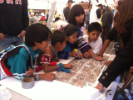Theodore S. Jojola
Professor, University of New Mexico School of Architecture and Planning

Zuni children participate in the process of planning in their community.

Wednesday, Nov. 14, 2018
6 pm - 7:30 pm
Hayes 403
"Indigenous Planning"
Professor Theodore S. Jojola, of the University of New Mexico School of Architecture and Planning, shares a planning approach that uses cultural identity to inform community development. The process for meaningful community engagement uses a 7 Generations model. He will present examples from the work of the Indigenous Design and Planning Institute (iD+Pi), University of New Mexico.
AIA Continuing Education Credits Available: 1 LU
AICP Continuing Education Credits Available: 1.5 CM
Examples of work
Biography
Theodore (Ted) Jojola, PhD, is a Distinguished Professor and Regents’ Professor in the Community & Regional Planning Program, School of Architecture + Planning, University of New Mexico (UNM). He holds a PhD in Political Science from University of Hawaii at Manoa where he attended the East-West Center. He has a Masters in City Planning from the Massachusetts Institute of Technology, and a BFA in Architecture from the UNM. He is an enrolled tribal member of the Pueblo of Isleta.
From 2008-2010, he was Visiting Distinguished Professor at Arizona State University where he was a member of the faculty of the School Geographic Sciences and Planning. He was Director of Native American Studies at UNM from 1980-1996, and established the interdisciplinary undergraduate degree program in Native Studies.
He is the founder of the Indigenous Design + Planning Institute and a cofounder of the Indigenous Planning Division of the American Planning Association. He is President of a non-profit foundation, The Society for the Preservation of American Indian Culture, as well as board member of other foundations including the Chamiza Foundation, Tricklock Theatre Company, the Bataan-Corregidor Foundation of New Mexico, and the Isleta Pueblo Housing Authority. Dr. Jojola teaches courses such as Indigenous Planning, Planning for Native Lands, Contemporary Indigenous Architecture, and Communication Techniques for Planning.


